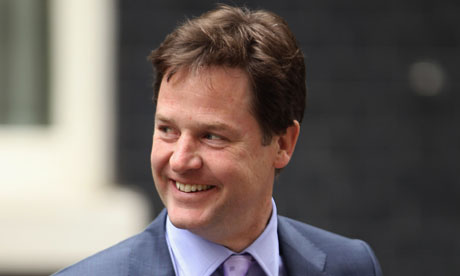
It's taken rebellions at his party's spring conference, a campaign by the doughty Shirley Williams, a trashing in the local elections and defeat of his AV referendum – but Nick Clegg has got there at last. His speech on the NHS was a measured, progressive and welcome description of what needs to happen and what must not happen to our National Health Service. The only shame is that it has taken Clegg this long to get here, and that it may already be too late.
Never mind his motives – we know that Clegg is trying to distinguish his party from the Conservatives – the sentiment is right: listening to patients first, no privatisation of the NHS and better integration of services. He has already made clear that Monitor, the health regulator, should not push competition as originally planned, but should encourage collaboration. Now Clegg is also making a stand on not allowing "any qualified provider" to take over services from the NHS. The penny has dropped that the only winners there will be are the private health firms.
When it comes to integrating services, Clegg has it right: "your physiotherapist talking to your surgeon … so after an injury, you're put on the best course of rehabilitation"; "social care services knowing when you're discharged from hospital … so that they can send someone round to look after you." At present, this isn't happening, with the result that too many patients end up back in hospital, because the aftercare was not thought through.
He needs to think more about GP commissioning. Clegg declares that "family doctors should only take on responsibility [for commissioning] when they are ready and willing". Where they are not yet ready, NHS managers will carry on doing the commissioning. But here's the problem: in many areas primary care trusts and NHS managers are already so confused about what is happening that the system is breaking down. Who can recruit when they don't know who will be running the ship? What happens to staff morale when they don't know if they will have a job for long? There is already too much uncertainly about GP commissioning and it needs to be put on hold.
And that's the real conclusion that Clegg should have drawn at the end of his speech – these plans are controversial, ill thought-out and should be dropped, not just sent back to a committee. As the BMA has just announced, the entire bill is "fundamentally flawed" and needs to be withdrawn. Labour's health spokesman John Healey agrees, calling for a recommittal of the bill, which would delay it by at least a year.
For if, as Clegg insists, patients voices must be heard, it will take a year to listen, rethink and come up with a new bill. Rather than trying to change significant parts of it, Clegg would do better to ditch it altogether. Without that he faces a prolonged battle with much of the Conservative party, who have recently decided that Andrew Lansley is their hero after all and will fight the Lib Dems clause by clause in the Commons.
In the end it's all about numbers: if the Lib Dems and Labour, together with some of the minor parties, decide they want to stop this disastrous bill, they can. Clegg has found his voice on health rather late in the day – now he needs to make himself heard.

